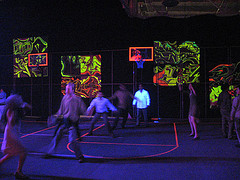Over a dinner party with friends Monday evening, the conversation turned to athletics. Specifically, college basketball, and the commentary and analysis of Charles Barkley. A friend thinks his analysis of the game is incredibly in-depth and deserving of respect. I’ve never been able to stand Barkley, from the first time I saw him play to the time he retired from the Phoenix Suns. I suppose I was never really interested in his commentary. He just irritated me. My friend says that that he projects a “tough guy” image, but that he is very good as a commentator.
Sort of a character in a play.
When I was an undergrad student and incredibly involved in nearly every production that came down the line in my theatre program, I discovered that I was a bit of an anomaly amongst my fellow theatre students, because I enjoyed watching sports. Specifically, I liked professional basketball. I wore Orlando Magic t-shirts. They had difficulty understanding why, and I had difficulty communicating the theatrical thrill of the opening introductions of the players (light show included) through the (hopefully) nail-biting close calls and amazing shots that kept me glued to the screen.
I realized, even at the time, that learning to love basketball was a way to connect with my father. He had played basketball through high school and in college, and we had difficulty understanding each other. He didn’t really get the theatre thing, but he tried very, very hard, for my sake. I thought the least I could do was to work toward an interest in basketball, as a way to connect with him. It worked. It was the launching point for a renewed relationship with my father.
I haven’t watched basketball since a few years ago, around my first semester of grad school, I think, when the L.A. Lakers had an historic starting lineup and couldn’t pull out a championship season. I determined then that it had become about the individual players, and not the love of the game. Sort of like how a prima donna ruins a production by robbing the play’s cast of its camaraderie. In any cast, I haven’t really watched professional basketball since. Perhaps not so coincidentally, neither has my father.
I don’t think I’m all that odd for being a “creative type” that enjoys athletics (I’m still a big tennis fan). In fact, I have many artist friends who follow various athletic seasons with much more intensity than myself. I’ve theorized that there’s a theatrical quality to athletic competition, something deeper than just spectacle. The spectacle, though, was okay in itself, and I didn’t explore the thoughts too deeply.
Todd Johnson solidified my theory that athletic events are, in fact, theatrical. The drama of the competition is, of course, the reason that those of us who watch sports are engaged (I’ve come up off of the sofa yelling at many a buzzer-beating shot in my life). Johnson says that this is framed, though, in the larger context of the story…the “through-line,” if you will…behind the game. Michael Jordan’s incredible game winning shot was incredible in itself, but stunning against the backdrop that it won the game at the last minute, and that it was the last game of his career (well, until he returned from retirement), and that he had succeeded despite the family tragedy he had experienced. Johnson says that this story is told through the commentary surrounding the actual competition of the game, and attributes this to the explosion in popularity of various sports commentary media outlets in recent years. I think this is also why many sports fans remember specific games like we remember great movies or plays, looking back to a particular performance with great nostalgia. Following the stories can have a positive impact on the audience, such as my relationship with my father. Participating in the story builds a camaraderie that is easily equivalent to the cast and crew of a play.
So my love of watching basketball was no contradiction to my theatrical bent. I was simply a spectator to a different type of theatre, one that told the drama of fellow humans in the same time but a different space, rather than fictional characters. I’ve always suspected that theatre explains a great deal of life. This just goes to prove that point.
Photo Attribution: ToastyKen

Amazing segue from your intro into the body of this essay!
You have presented strong evidence to support the idea that all of life (and death) is, in a way, theater. All other theater (on an actual stage or a basketball court)is merely a vignette of the TRUE PERFORMANCE.
There’s a growing volume of work on theatre as a theological exercise and metaphor for life and spirituality. They’re worth reading. And thanks for the compliment!